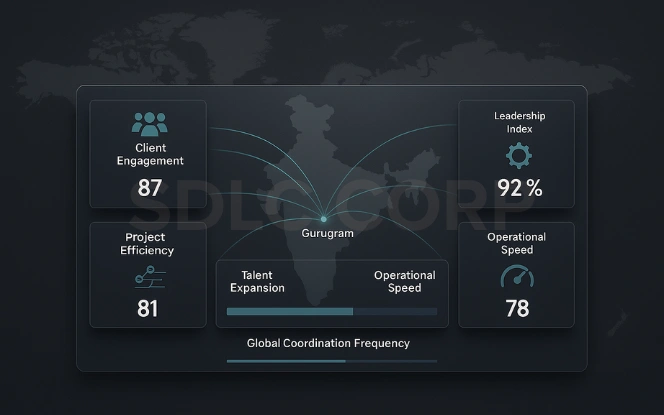Introduction
Global Capability Centers India have reshaped how multinational companies plan and operate. Over two decades, India has become the India capability center capital through six cities – Bengaluru, Hyderabad, Mumbai, Chennai, Pune, and Gurugram. Together, they built a foundation of innovation, infrastructure, and talent that now drives the world’s largest GCC network.
More than 1,700 Global Capability Centers (GCCs) now operate across India, employing millions of professionals in engineering, analytics, and automation. These centers no longer serve as back-office units but as strategic partners shaping products, technology, and decision-making for global enterprises.
The following sections explore how these six cities built India’s leadership as the global capability center capital and why they continue to attract investment from the world’s top organizations.
Evolution Of India’s GCC Landscape

The evolution of Global Capability Centres India represents the transformation of the country’s business model from a support-based system to a high-value innovation network. Initially, Global Capability Centers (GCCs) were established for back-office operations and cost efficiency. However, as global demands evolved, so did India’s capability to deliver strategic outcomes.
This transformation occurred in three distinct stages:
• Early Development: During the first decade, companies leveraged India for IT services, support functions, and software maintenance.
• Growth & Maturity: Gradually, firms began delegating advanced analytics, financial planning, and supply chain design.
• Strategic Evolution: Today, GCCs in India operate as digital innovation hubs, directly influencing global strategy.
The transition was supported by several factors , strong education infrastructure, policy reforms, and the rise of digital-first business models. India’s ability to align technological talent with enterprise goals has been central to this shift. These centers now handle product development, cybersecurity, AI research, and decision intelligence for global organizations.
Furthermore, collaboration between government and industry has fostered an ecosystem that prioritizes knowledge transfer and digital innovation. Many companies now view India’s GCCs as an essential part of their transformation journey rather than an extension of operations.
India’s journey showcases not just economic growth but the creation of intellectual and operational capital that drives global business success. To understand how GCCs evolved into this powerful model, visit What is GCC?.
Key Growth Drivers Behind The Rise

The rise of Global Capability Centres India has been propelled by a set of interconnected factors that strengthen one another. These growth drivers have redefined how global enterprises view India – not as an outsourcing hub, but as a core innovation partner.
Major growth enablers include:
• Talent Quality: India’s universities supply a steady stream of skilled professionals in engineering, data science, and management.
• Scalability: The presence of multiple mature cities allows seamless expansion across regions.
• Government Initiatives: Reforms such as simplified regulations and business parks enhance foreign investment.
• Technological Readiness: Digital infrastructure supports real-time global collaboration.
• Cultural Compatibility: Professionals adapt quickly to multinational environments, reducing transition costs.
India’s value proposition lies in its ability to deliver innovation at scale. Companies find that the depth of technical expertise, coupled with affordability, supports long-term strategic objectives. Over time, GCCs have expanded from performing transactional tasks to leading product engineering, automation, and analytics innovation.
Moreover, India’s focus on upskilling has strengthened this foundation. Continuous learning programs and partnerships with universities ensure that employees remain globally competitive. This alignment between human capability and business demand is the strongest among emerging economies.
These GCC growth drivers India collectively reinforce India’s dominance in capability building. To explore how AI and digital intelligence are shaping modern centers, read AI-First Global Capability Centers GCCs (UK).
Bengaluru – The Innovation And Technology Leader

Bengaluru remains the nucleus of Global Capability Centers India and a benchmark for global innovation ecosystems. Often referred to as India’s technology capital, Bengaluru combines infrastructure, research depth, and a progressive workforce culture that enables large-scale innovation.
Key strengths that define Bengaluru’s dominance include:
- Innovation Ecosystem: Bengaluru fosters continuous innovation through strong collaboration between startups, universities, and multinational corporations. This interaction fuels the exchange of ideas and accelerates the creation of new technologies. The city’s culture of experimentation makes it the preferred choice for companies building future-ready Global Capability Centres.
- Talent Concentration: The city attracts top-tier developers, designers, and engineers from across India because of its career opportunities and strong professional community. This steady talent influx supports specialized roles in AI, software development, and analytics. Bengaluru’s rich human capital ensures companies always have access to skilled professionals for complex global projects.
- Infrastructure: Bengaluru offers modern technology parks, strong internet connectivity, and reliable public utilities that improve work efficiency. Well-planned business zones such as Whitefield and Electronic City provide scalable spaces for large enterprises. The availability of co-working hubs and digital infrastructure further enhances collaboration and productivity across teams.
- Corporate Diversity: From fintech and healthcare to aerospace and gaming, Bengaluru supports a broad range of industries through its Global Capability Centres. This diversity promotes cross-sector innovation and knowledge sharing. It also ensures business resilience, as companies from different domains contribute to the city’s strong and balanced economic growth.
Beyond its infrastructure, Bengaluru’s leadership stems from a forward-thinking mindset. Companies here prioritize innovation, agility, and cross-functional collaboration. The city’s openness to new technologies like automation and generative AI has transformed how global firms develop and deliver products.
In addition, Bengaluru’s ability to integrate research with execution makes it unique. GCCs here influence global business strategy, not just delivery. This makes Bengaluru the innovation engine behind India’s rise as the India capability center capital.
To explore its contribution to global competitiveness, visit Global Capability Centers.
Hyderabad – The Scalable Powerhouse

Hyderabad stands out as the most balanced and scalable hub among Global Capability Centres India. It combines cost efficiency with robust infrastructure and long-term policy support, enabling multinational corporations to scale rapidly.
Key advantages that set Hyderabad apart:
• Policy Excellence: The Telangana government’s clear focus on technology, infrastructure, and ease of business attracts global investors.
• Talent Availability: Consistent supply of engineers and data professionals ensures business continuity.
• City Infrastructure: Hyderabad’s planned tech corridors and smart facilities create efficient work environments.
• Business Diversity: GCCs operate across industries including healthcare, telecom, retail, and logistics.
Hyderabad’s growth also reflects its ability to maintain equilibrium between innovation and affordability. Unlike congested metros, it offers expansion without significant cost escalation. The city’s proactive governance and digital adoption have made it a global benchmark for sustainable growth.
Moreover, Hyderabad’s focus on emerging sectors like cybersecurity, AI, and biotechnology reinforces India’s global reputation for innovation. Its cultural inclusivity and low attrition rates further add to business stability, making it a long-term strategic destination.
For high-performance GCC models and scaling frameworks, explore Build a High-Performance Global Capability Center GCC (UAE).
Mumbai – The Financial And Business Nerve Center

Mumbai’s role in Global Capability Centres India is defined by its financial expertise, business sophistication, and strategic importance. It serves as the operational heart for global enterprises managing high-value, regulated functions.
Distinctive attributes of Mumbai’s GCC landscape:
• Financial Leadership: Global banks and financial service companies establish centers here for governance and compliance.
• Talent Ecosystem: The city hosts financial analysts, legal experts, and business consultants with domain expertise.
• Corporate Infrastructure: Access to world-class commercial districts enhances efficiency.
• Strategic Connectivity: Strong domestic and global links facilitate coordination with headquarters abroad.
Mumbai’s ecosystem merges traditional finance with digital innovation, driving intelligent transformation across industries. The city’s exposure to global markets ensures that its GCCs deliver not just operational support but strategic insights as well.
Additionally, Mumbai provides unmatched access to decision-makers, regulatory institutions, and investment firms, creating a reliable environment for financial innovation. The presence of multinational corporations and fintech startups fosters continuous learning and collaboration. This synergy between established players and new-age disruptors gives Mumbai an edge over other financial centers. As more companies explore India for strategic expansion, Mumbai’s credibility and professional maturity make it the natural choice for managing mission-critical global operations.
Moreover, the concentration of financial professionals, combined with the availability of specialized services, positions Mumbai as a center for enterprise excellence. The collaboration between technology and finance ensures future-ready governance and innovation.
To learn more about building GCCs in financially active regions, refer to How Much Does It Cost to Set Up a Global Capability Center?.
Chennai – The Engineering And Industrial Edge

Chennai contributes to Global Capability Centres India with its deep engineering foundation and industrial efficiency. The city blends precision, discipline, and innovation, offering unmatched support for manufacturing-driven GCCs.
Core capabilities driving Chennai’s GCC success:
• Engineering Heritage: The city’s strong engineering base fuels product design and development.
• Manufacturing Synergy: Collaboration between factories and IT services accelerates automation.
• Talent Reliability: Low attrition and consistent skill levels ensure stability.
• Infrastructure: Efficient logistics and modern industrial zones enhance connectivity.
Chennai’s industrial character complements India’s vision of becoming a global technology and production hub. Its ability to merge traditional engineering with digital tools makes it indispensable for advanced manufacturing projects.
The city’s work ethic, combined with access to a steady talent pool, encourages companies to locate long-term R&D operations here. Additionally, Chennai’s rising focus on smart factories and sustainable production models strengthens India’s global manufacturing reputation.
For best practices in engineering-led capability centers, visit High-Performance Global Capability Center GCC (US).
Pune – The Emerging Technology And Diversification Hub

Pune has become one of the most promising contributors to Global Capability Centres India. It offers an ideal combination of educational excellence, affordability, and innovation diversity that appeals to both startups and multinational enterprises.
Distinct advantages Pune provides to global firms:
• Educational Network: Pune is home to top technical and research institutions that supply skilled engineers, developers, and data scientists. This academic strength ensures a continuous pipeline of qualified talent for GCCs across industries.
• Technology Depth: The city’s GCCs specialize in emerging domains such as artificial intelligence, automation, cybersecurity, and digital product design, supporting end-to-end innovation.
• Cost Advantage: Pune’s affordable real estate and operational costs allow companies to expand efficiently without compromising quality, making it ideal for both small-scale and enterprise-level setups.
• Sustainability Focus: The city encourages eco-friendly business practices, renewable energy adoption, and green infrastructure, aligning with global ESG standards.
Pune’s balanced ecosystem encourages collaboration between academia, startups, and corporates. Its open innovation model has attracted major technology firms seeking agility and creative thinking. The presence of IT parks, innovation labs, and co-working hubs further enhances cross-industry partnerships and accelerates product development cycles.
Because of its strategic location near Mumbai, Pune also benefits from access to diverse talent and shared business resources across the western corridor. Its growing reputation for quality of life, skilled professionals, and research-driven culture strengthens India’s image as a hub of intelligent capability building. The combination of lifestyle quality, professional opportunity, and innovation depth positions Pune as a vital contributor to India’s digital transformation journey.
Gurugram – The Corporate Operations Hub

Gurugram stands as the corporate command center of Global Capability Centres India. It plays a central role in business governance, analytics, and consulting for multinational firms managing operations across multiple continents. Its strategic position near the national capital gives it access to leadership, decision-making networks, and global business visibility.
Core strengths defining Gurugram’s leadership:
• Strategic Access: Gurugram’s proximity to New Delhi provides immediate access to policy-making institutions, corporate headquarters, and international embassies. This proximity allows quick coordination between businesses, regulators, and global stakeholders.
• Diverse Skill Base: The city attracts professionals skilled in project management, business strategy, financial analytics, and corporate law. This diversity enables GCCs to manage complex global projects efficiently.
• World-Class Facilities: Gurugram’s modern business districts offer advanced infrastructure, including tech-integrated office spaces, global connectivity, and sustainability-focused design. These factors create a seamless environment for innovation and collaboration.
• Operational Agility: The city’s ability to manage remote teams and multiple time zones allows organizations to maintain 24×7 global continuity, improving speed and productivity.
Gurugram’s corporate ecosystem reflects a balance between strategic management and execution excellence. The city has evolved into a hub for decision-making, leadership development, and data-driven governance. Its professional culture emphasizes efficiency, accountability, and innovation – qualities that attract top global firms.
Furthermore, Gurugram’s cosmopolitan workforce and business-friendly environment encourage knowledge sharing and cross-sector partnerships. With its strong corporate foundation and high adaptability, Gurugram continues to anchor India’s position as a leader in global enterprise operations.
To explore models for scaling corporate operations globally, read AI-First Global Capability Centers GCCs (UK).
Conclusion
India’s six powerhouse cities have turned the country into the global capability center capital. Bengaluru drives innovation, Hyderabad scales efficiently, Mumbai anchors finance, Chennai excels in engineering, Pune supports diversification, and Gurugram manages corporate leadership.
Global Capability Centres India are no longer just service hubs – they are global innovation engines creating new standards of performance. These centers combine local expertise with global strategy to deliver transformative value.
To start your journey or scale your Global Capability Center (GCC) in India, Contact us SDLC Corp.
FAQs
What Are Global Capability Centres India?
Global Capability Centres India are strategic hubs where global companies manage operations such as research, data analytics, product design, and digital transformation. These centers support innovation and help enterprises improve efficiency while reducing operational costs.
Why Is India Known As The Global Capability Center Capital?
India is known as the global capability center capital because of its strong talent pool, advanced infrastructure, and supportive government policies. The combination of skilled professionals and cost efficiency makes Indian cities ideal for setting up and scaling Global Capability Centers.
Which Indian Cities Lead The Global Capability Centre Growth?
Bengaluru, Hyderabad, Mumbai, Chennai, Pune, and Gurugram lead the growth of Global Capability Centres India. Each city brings unique strengths such as innovation, scalability, financial expertise, and advanced engineering that drive global business transformation.
What Are The Key GCC Growth Drivers India Offers?
The main GCC growth drivers India offers include a skilled workforce, reliable digital infrastructure, and strong policy support. These drivers help multinational firms build high-performance capability centers that focus on innovation, research, and customer experience.
How Does SDLC Corp Help Businesses Build Global Capability Centres In India?
SDLC Corp helps global businesses establish and manage Global Capability Centres India by providing strategic consulting, design, and implementation support. The company focuses on operational excellence, digital integration, and long-term business scalability.





